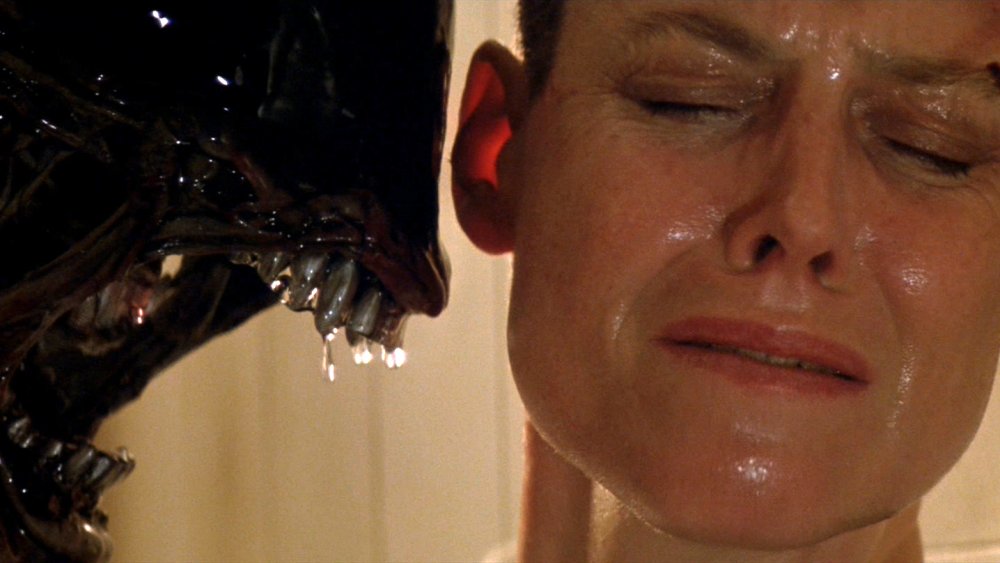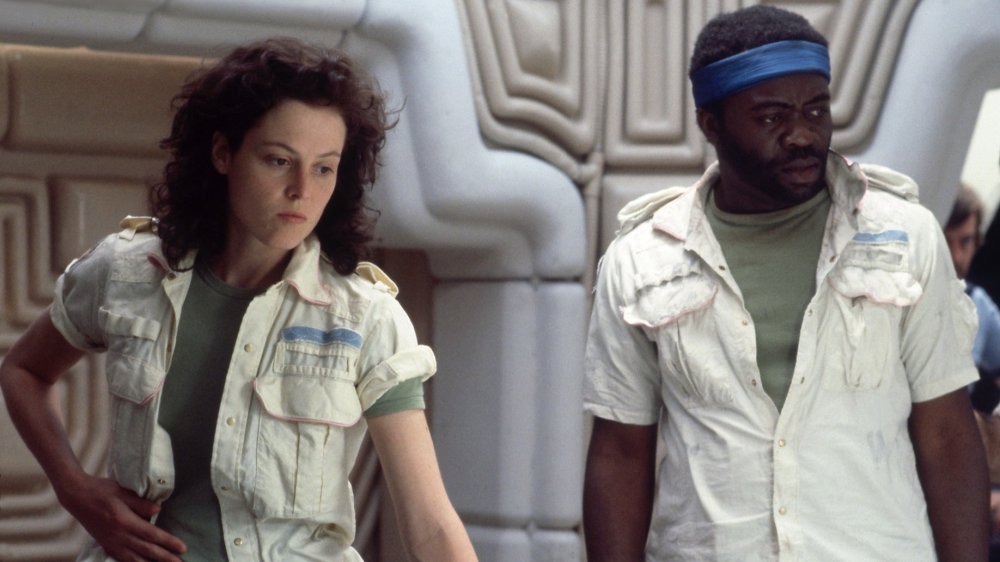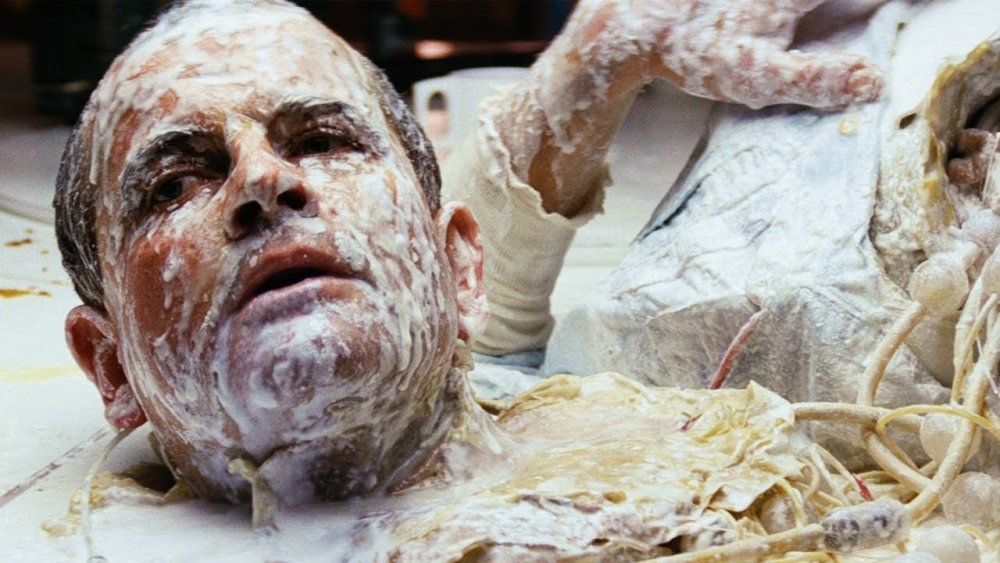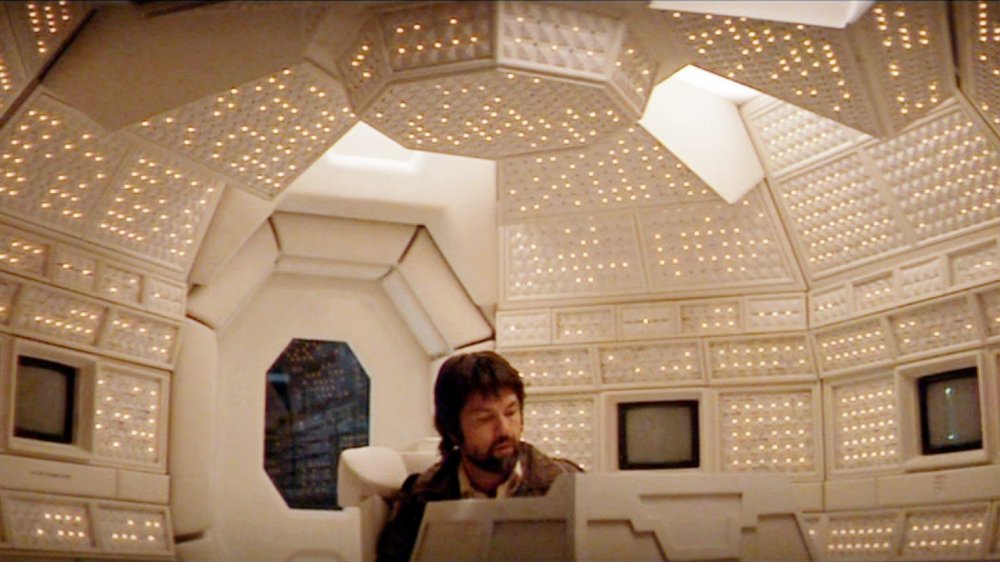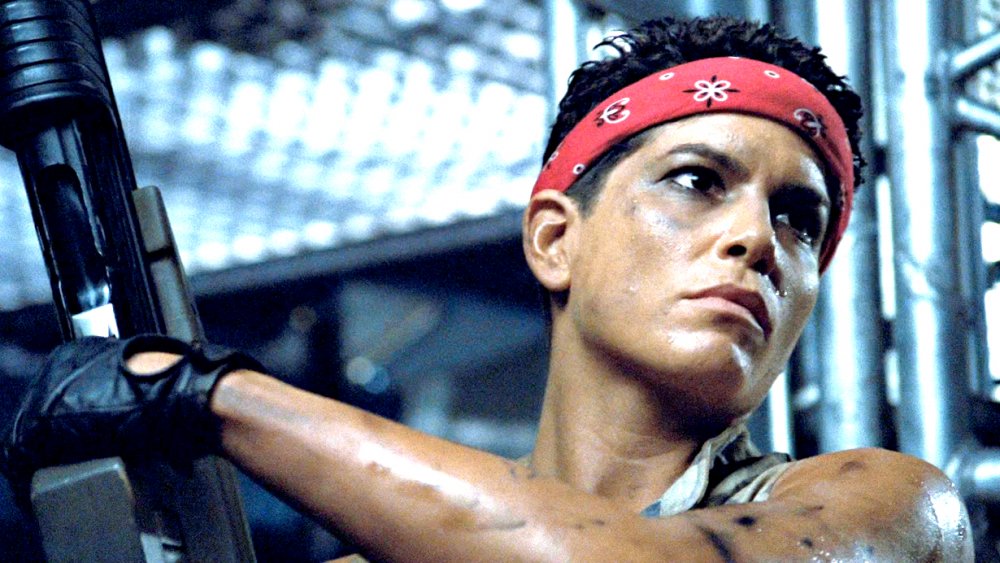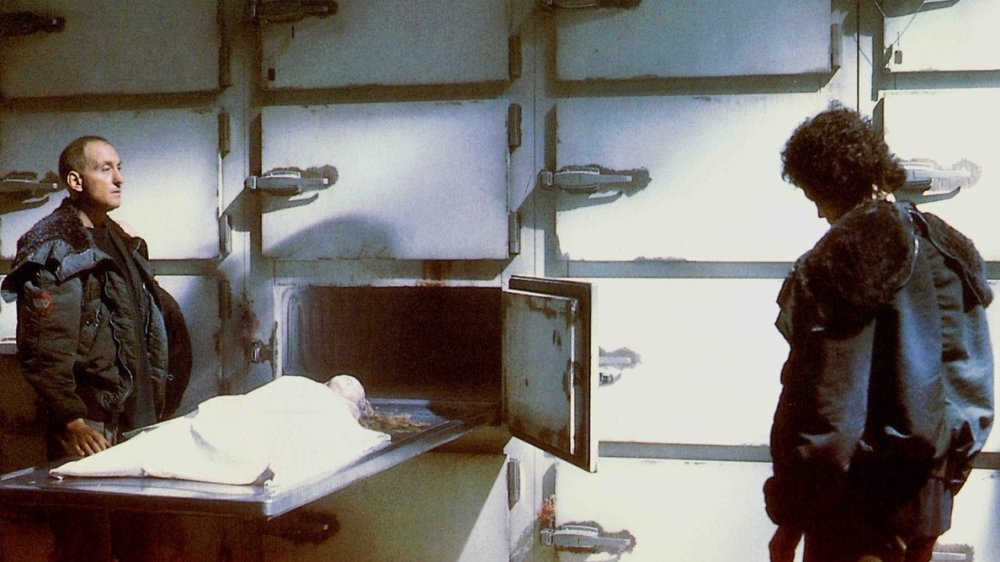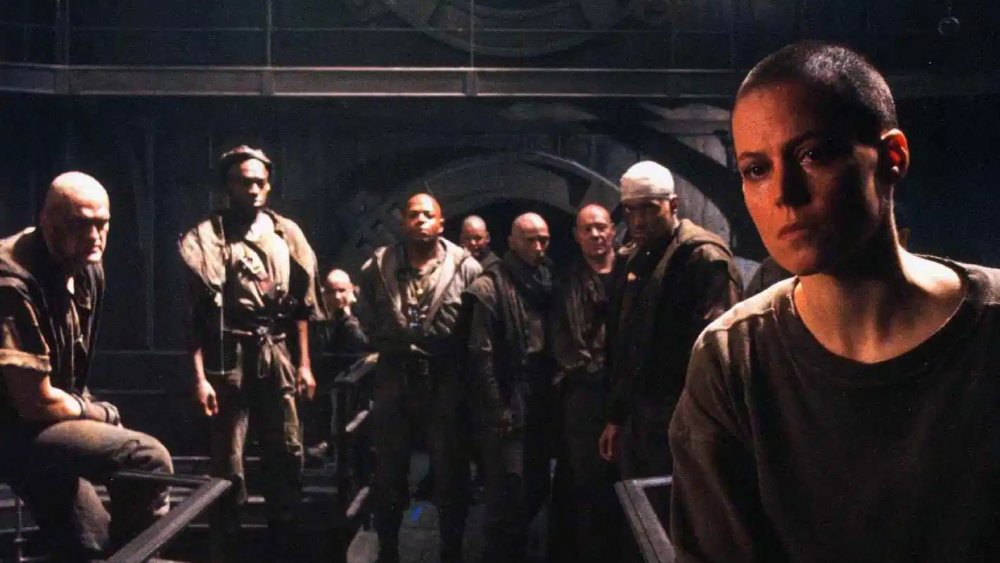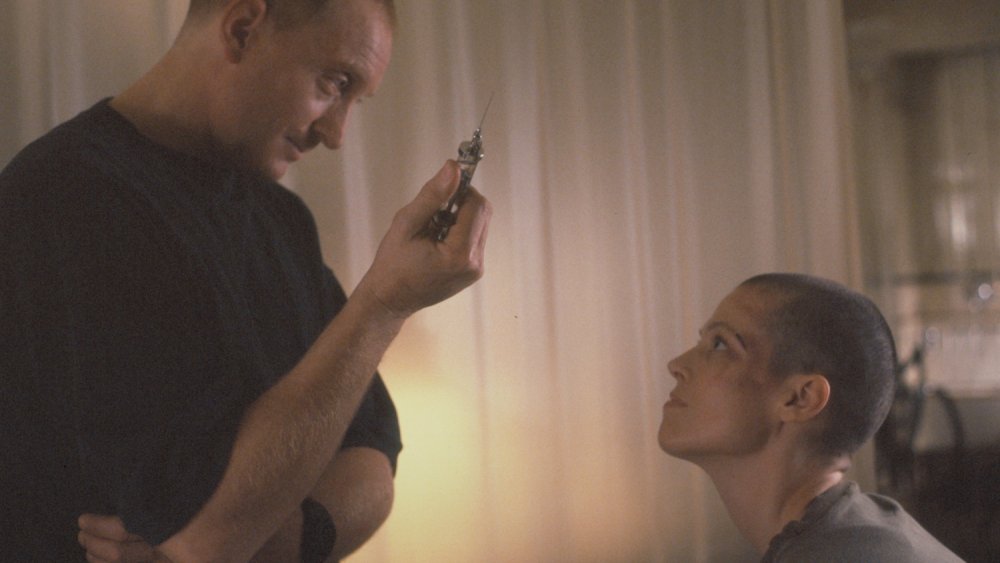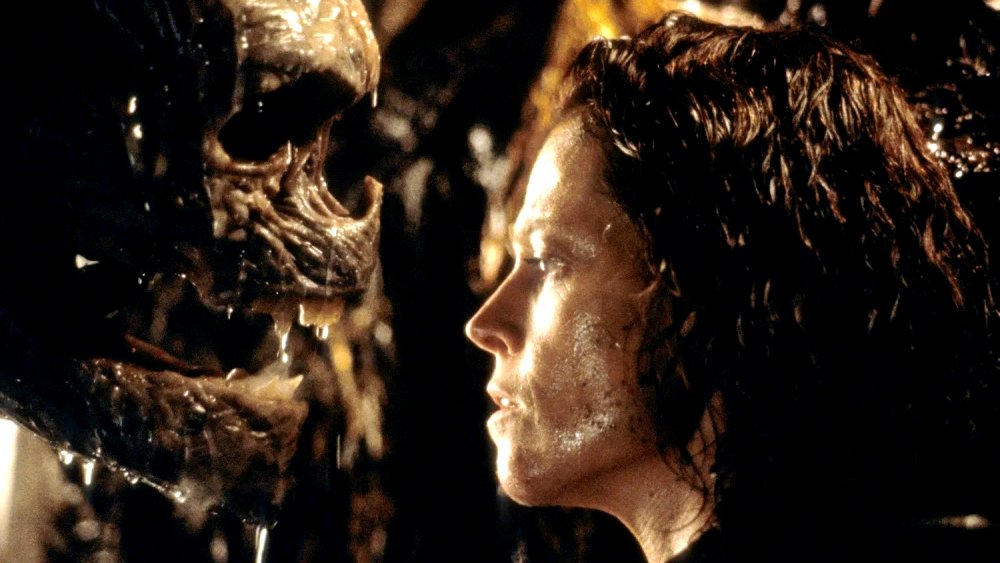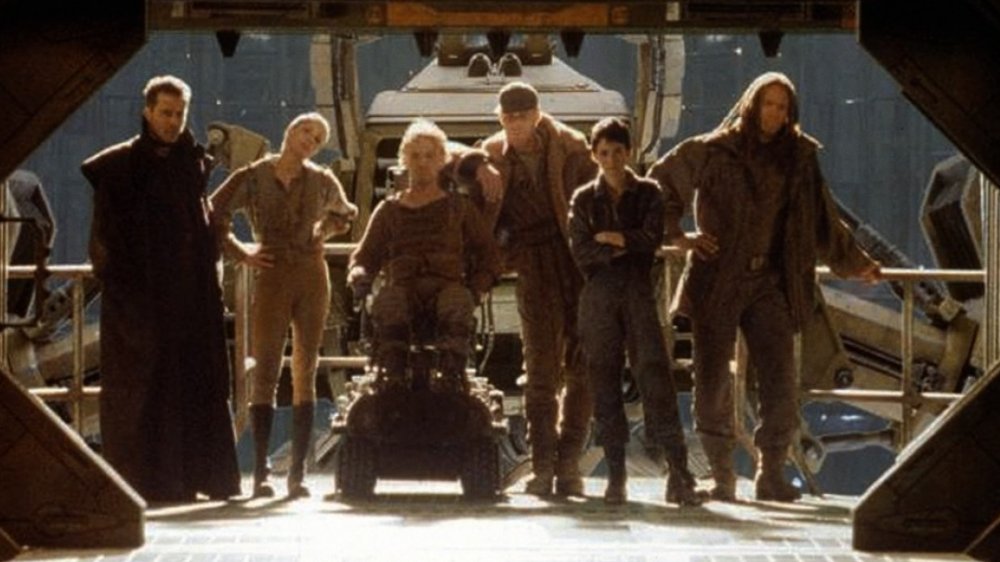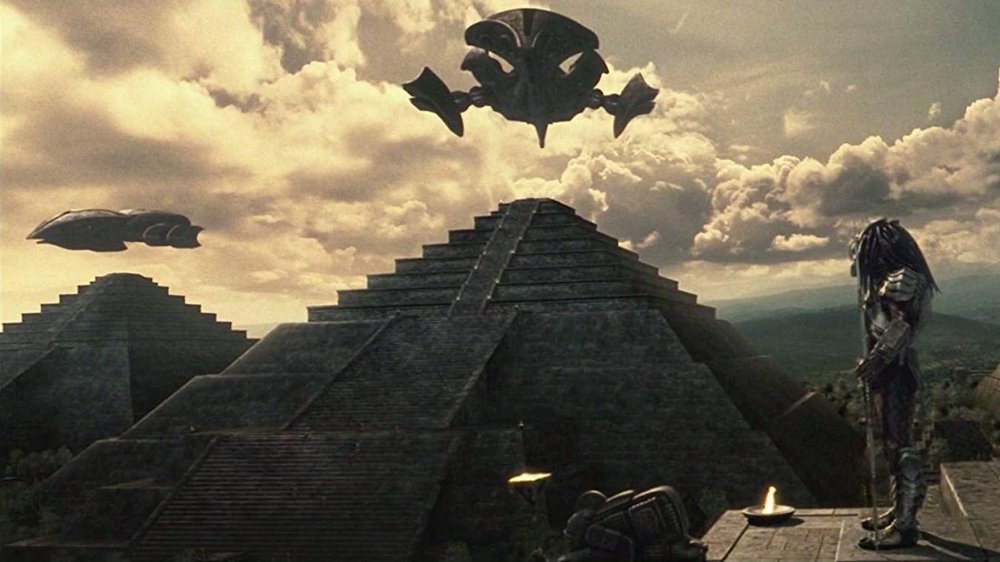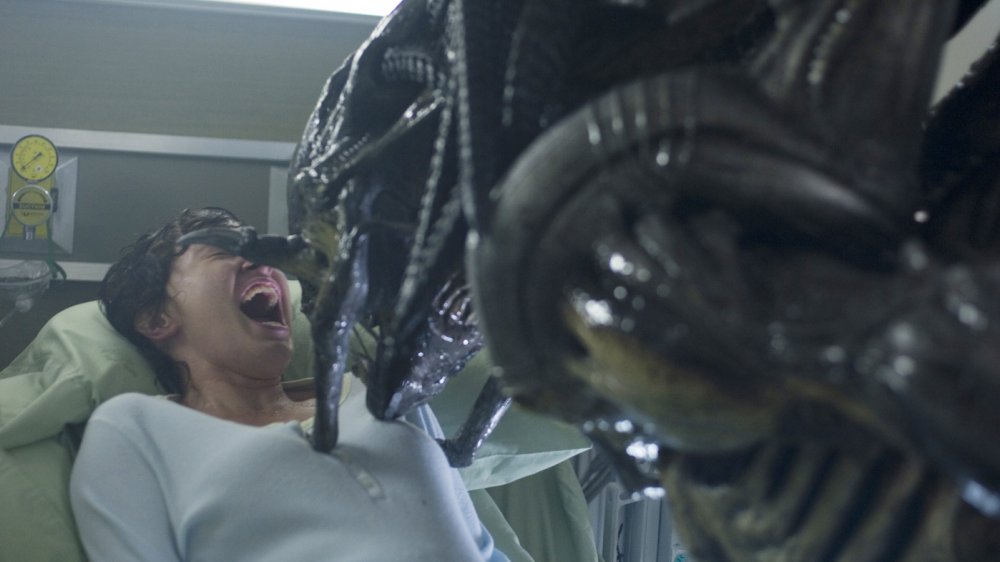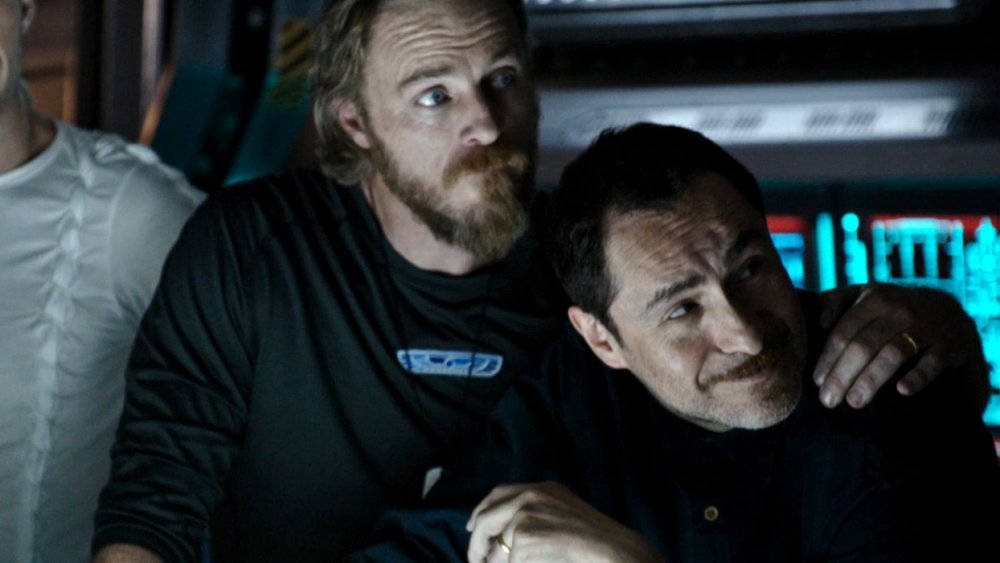Moments From The Alien Franchise That Didn't Age Well
Some movies stand the test of time, and even as they become expansive multi-film and cross-media franchises, people still return to the originals and find their magic intact. Alien is one such movie. Directed by Ridley Scott and starring Sigourney Weaver, that 1979 film is a classic of sci-fi horror. Its 1986 sequel, Aliens, was directed by James Cameron and brought in more high-octane action, making it an influential classic in its own right.
Since then, there have been two more sequels with Sigourney Weaver, followed by two crossovers with the Predator franchise, and more recently two prequels that Ridley Scott returned to direct. Some of the movies are better than others (and none of them are as good as the first two), but it's a brand that holds up pretty well.
Unfortunately, no movie is without its flaws, and the passage of time can make those flaws seem more glaring. Whether it's evolving social norms or just developing technology, the present leads us to ask harder questions about the past. While we all love the Alien movies, we also love to pick apart the things we love. So with that in mind, here are some parts of the Alien saga that haven't stood the test of time.
Race and gender on the Nostromo in 'Alien'
The class issues in Alien are intentional, and add an interesting layer to the sci-fi setting. Parker (Yaphet Kotto) and Brett (Harry Dean Stanton), the guys that work "downstairs" in the engine room — basically the ship's mechanics — know they're getting paid less than the rest of the crew, and they're not happy about it. Of course, the fact that the blue collar crew members are represented by a black guy and a hillbilly implies that all too little has changed since our own time, but you can chalk that up to intentional commentary as well.
What's worse is how the tension between Parker and Warrant Officer Ripley (Sigourney Weaver) comes off these days. While the story Alien seems interested in telling is about class and authority, the fact that the angry worker is a black man and the authority figure he's most aggressive toward is a white woman creates an air of sexism, whether it's intentional or not. Moreover, it's not only unfortunate to see that sexism directed at Ripley in this future time, it's even worse that its source is the ship's only black crew member.
Ash's detached head comes alive
One thing that has aged incredibly well about Alien is the visual effects. The ships, the eggs, the face-hugger, and the alien itself all hold up and look amazing. Even the famous chest-burster scene remains believably grisly. There's only one moment in the entire movie that will make you think "this sure was made 40 years ago," and that's the scene when the android Ash (Ian Holm) has his head knocked off, and then they reanimate it to gain information about the alien.
It's actually the editing that really hurts the scene. You see Yaphet Kotto trying to get a rubber Ash head to stay upright on the table, but it keeps rocking backward. Then there's a jarring cut and suddenly the head is no longer rubber — it's recognizably Ian Holm sitting under the table with his head sticking through a hole. The filter they put on Holm's voice when he speaks, making it sound like the android's voice box is damaged, almost makes up for it, but the switch from fake head to real head is hard to forget.
The problem with Mother
The computer on board the Nostromo in Alien is called Mother, which is a nice touch. However, considering the movie's supposed to take place 200 years in the future, it's a little weird that Mother occupies an entire room full of blinking lights and green monochrome monitors. This is especially driven home late in the film when Ripley decides to ask Mother about the company's orders regarding the alien life form that's already killed half the crew.
How does one ask Mother questions? By typing them in response to a DOS-style command prompt on one of those green-on-black monitors. When Alien came out in 1979, this was what people recognized as the way computers worked. Now that we're having conversations out loud with the computer phones we carry in our pockets, however, the idea that one would need to type commands into a computer in the far future seems a bit laughable. Fortunately the eeriness of that scene, particularly when Ash silently appears behind Ripley, is enough to keep most viewers from laughing.
The treatment of Vasquez in 'Aliens'
Whereas Alien is about an unsuspecting crew being forced to confront a monster for which they're thoroughly unprepared, Aliens features a group of space marines who fight monsters for a living. The toughest of those marines is Vasquez (Jenette Goldstein), a muscular Latina woman with very short hair and a very big gun. We're introduced to Vasquez and the most comical of the marines, Hudson (Bill Paxton), at the same time.
Seeing Vasquez doing pull-ups after they've just emerged from hypersleep, Hudson asks, "Hey Vasquez, have you ever been mistaken for a man?" to which she responds dryly, "No. Have you?" It's a rare treat to see a gender-nonconforming character like Vasquez in an action movie from the '80s, it's just a shame that she has to be introduced with a moment of gender-policing. It's also a shame that Vasquez is a woman of color played by a white actress, but that's a separate issue.
'Alien 3' immediately ruins the ending of 'Aliens'
Aliens has the most hopeful ending in the entire franchise. The alien queen has been defeated. Ripley has rescued Newt (Carrie Henn), the young girl with whom she's developed a mother/daughter bond. Along with the injured marine Hicks (Michael Biehn) and the heavily damaged android Bishop (Lance Henrikson), they escape and enter hypersleep in hopes of rescue and an alien-free life to come.
Unfortunately, Alien 3 has no room for hope, and no interest in escape. Basically the first thing we learn at the start of the movie is that Newt and Hicks are dead, and Bishop has been destroyed. The surrogate family that Ripley had found for herself is immediately gone, and instead she's left with nothing but a hostile planet and an Alien Queen embryo. So it's no surprise, of course, when Alien 3 turns out to have the least hopeful ending in the franchise, with Ripley sacrificing her life to insure the death of the Alien Queen.
Sexual dynamics on Fiorina 161
Alien only has two female characters: Ripley and Lambert. Aliens only has three that stay alive for more than a few minutes: Ripley, Vasquez, and Newt. In Alien 3, Ripley's the only woman in the entire movie. What's even worse is that the gender disparity is introduced with an implicit threat of sexual assault, when Ripley is warned that the men of Fiorina 161, the prison colony where she's crash-landed, haven't seen a woman in years.
Later in the movie, Ripley approaches Dillon (Charles S. Dutton), the spiritual leader of the prisoners, to thank him for officiating the funeral for Newt and Hicks. Dillon replies, "You don't wanna know me, lady. I'm a murderer and rapist of women." This is presented as a moment for Ripley to show her strength and fearlessness, sitting down across from him and saying, "Really? Well, I guess I must make you nervous." But isn't Ripley strong enough without having to stand up to implicit threats of sexual violence? And don't the aliens bring enough menace to her story without adding a planet full of misogynistic criminals? It's the sort of thing that just hits differently in 2020 than it probably did in 1992.
Sex? In an 'Alien' movie?
Alien 3 also includes consensual sex, which might be even more jarring considering the complete absence of sex in the series up to that point. There seemed to be a bit of sexual tension between Ripley and Hicks in Aliens, but it never even came close to going anywhere. In contrast, after she befriends Clemens (Charles Dance), the doctor on Fiorina 161 and its most likable inhabitant, it doesn't take long at all for them to have this exchange:
Ripley: Are you attracted to me?
Clemens: In what way?
Ripley: In that way.
Clemens: Very direct.
Ripley: I've been out here a long time.
We don't see them actually having sex; the movie just cuts to them waking up in bed together. Still, it's really weird that three movies in Ripley's suddenly up for sleeping with some guy she just met, when that's never been a part of her character before.
Ripley's cloning in 'Alien: Resurrection' makes no sense
After Ripley dies at the end of Alien 3, she's cloned at the beginning of Alien: Resurrection. She's not the one that the scientists are after, though. They want the alien queen embryo that was gestating within her before her death. And on their eighth attempt, they succeed. Yes, they clone Ripley and the separate creature that was inside her body, and then they cut that creature out of her body and let it grow to maturity. Because that's how cloning works 400 years in the future, supposedly?
We have to assume the idea is that Ripley's DNA and that of the alien queen mixed together in the gestation period, which does make some sense since aliens take on characteristics of the creature that hosted them. But the idea that you could use that DNA to reproduce two separate beings is completely absurd.
Sure, the movie also makes it clear that Ripley's now part alien and the alien's now part human, but that makes even less sense. Ripley's blood is shown to be acidic, but her flesh still looks and seems to feel human. So how is she alive? Wouldn't her own blood eat through her body, if it can dissolve a spaceship floor? There are no good answers to these questions, because Alien: Resurrection is much more interested in seeming cool than making sense.
Disability in the 24th Century
Alien Resurrection also introduces a crew of mercenaries, hired to deliver a bunch of stolen human bodies that can be used to gestate aliens. One of those mercenaries is Vriess (Dominique Pinon), a paraplegic mechanic who uses a motorized wheelchair. Now, there's certainly nothing wrong with a disabled character in a futuristic space setting. In fact, representation is a positive thing, although by today's standards it would have been preferable to cast an actor with an actual disability in the role, rather than the able-bodied Pinon.
The problem is that the chair often seems to be Vriess's defining trait, particularly in the eyes of the other characters. The worst example of this is when the need to escape from the alien-infested ship becomes urgent, and Vriess's crewmate Johner (Ron Perlman) says, "If we wanna make any decent time, I say we ditch the cripple." Johnner follows that up with "No offense," and Vriess responds "None taken" as he gives Johner the finger. It's true that Johner is established as a rude jerk, but it's still troubling to see the franchise's first disabled hero mocked for his disability.
Predators built the pyramids according to 'Alien Vs Predator'
Alien vs. Predator, as the name makes pretty clear, brings the Alien franchise together with the Predator franchise, and in fact establishes that the two extraterrestrial races have been engaging in ritualized combat for thousands of years. The action begins when the human protagonists discover an ancient pyramid under the antarctic ice, and make their way down to it only to find themselves in the middle of a centennial ritual where a group of Predators breed and release some aliens, in order to prove their mettle by hunting and killing them before they're killed in turn.
The humans includes some archeologists, who compare the antarctic pyramid to both Egyptian and Mayan structures, which leads to the reveal that the Predators were responsible for the ancient pyramids on Earth, and that they were worshiped as gods by the people they helped build them. AVP is hardly the first movie to introduce this idea, nor is it the most interesting. Despite the popularity of that TV show featuring the guy with distinctive hair, it's widely understood these days that theories about aliens building the pyramids aren't just farfetched, they're insulting and implicitly racist. There would be no reason to posit alien interference, after all, if we just accepted that ancient brown people were just as capable of impressive feats of engineering as any European.
A new kind of impregnation in 'AVP: Requiem'
The main antagonist of the second AVP movie, Aliens vs. Predator: Requiem, is a combination alien/Predator referred to (although not in the movie) as the Predalien. Aside from just being bigger and scarier than the average alien, the Predalien has a new means of reproduction. Unlike the standard aliens, it has no need for eggs and facehuggers — it just implants an embryo directly into a woman's body via her throat, impregnating her with a deadly embryo.
The objectionable part of this is not the method of implantation, it's that it only happens to women. Never before has an alien embryo required the presence of a human womb to grow — it just needs a warm body. In fact, this is part of what makes the body horror of Alien so effective: a man is the one assaulted and "impregnated," the sort of violation that's traditionally only visited upon women. That movie was released in 1979, but almost three decades later in 2007's AVP: Requiem, we're presented with a monster that only impregnates women. Frankly, that's a weird step backwards.
The failure of representation in 'Alien: Covenant'
Alien: Covenant came out in 2017, not long ago at all, but there's one aspect of it that's already aged badly, and in fact seemed painfully old-fashioned even at the time. Before the movie even opened, news broke that two of the characters would be a gay couple, Lope and Hallett (Demián Bichir and Nathaniel Dean). Across the internet, much was made of this big social step forward for the franchise.
Then the movie actually came out. The first indication that the two were in a relationship comes when Hallett is killed, and Lope is particularly upset about it. That's it. There's no interaction between them that indicates they're together, nor do either of them discuss it with anyone else. Lope is eventually killed too, but it would probably be unfair to invoke the "Bury Your Gays" trope when the nature of an Alien movie is that almost all the human characters die. It's just a shame that Lope and Hallett didn't get more time to be characters, and to show their love for each other, before those deaths came.
This misstep of representation is even more noticeable today than it seemed in 2017, which illustrates just how quickly something in a movie can age poorly. All things considered, the Alien franchise has fared better than many, and most of these movies largely hold up today. No cultural artifact, however, is immune to the march of time and the evolution of social norms that goes along with it.
